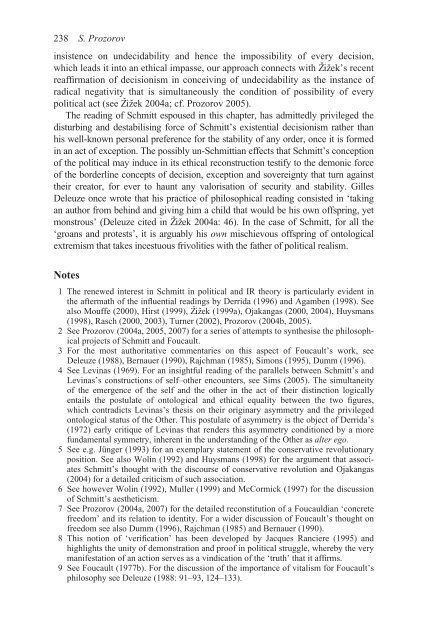The International Political Thought of Carl Schmitt: Terror, Liberal ...
The International Political Thought of Carl Schmitt: Terror, Liberal ...
The International Political Thought of Carl Schmitt: Terror, Liberal ...
Create successful ePaper yourself
Turn your PDF publications into a flip-book with our unique Google optimized e-Paper software.
238 S. Prozorov<br />
insistence on undecidability and hence the impossibility <strong>of</strong> every decision,<br />
which leads it into an ethical impasse, our approach connects with Zˇizˇek’s recent<br />
reaffirmation <strong>of</strong> decisionism in conceiving <strong>of</strong> undecidability as the instance <strong>of</strong><br />
radical negativity that is simultaneously the condition <strong>of</strong> possibility <strong>of</strong> every<br />
political act (see Zˇizˇek 2004a; cf. Prozorov 2005).<br />
<strong>The</strong> reading <strong>of</strong> <strong>Schmitt</strong> espoused in this chapter, has admittedly privileged the<br />
disturbing and destabilising force <strong>of</strong> <strong>Schmitt</strong>’s existential decisionism rather than<br />
his well-known personal preference for the stability <strong>of</strong> any order, once it is formed<br />
in an act <strong>of</strong> exception. <strong>The</strong> possibly un-<strong>Schmitt</strong>ian effects that <strong>Schmitt</strong>’s conception<br />
<strong>of</strong> the political may induce in its ethical reconstruction testify to the demonic force<br />
<strong>of</strong> the borderline concepts <strong>of</strong> decision, exception and sovereignty that turn against<br />
their creator, for ever to haunt any valorisation <strong>of</strong> security and stability. Gilles<br />
Deleuze once wrote that his practice <strong>of</strong> philosophical reading consisted in ‘taking<br />
an author from behind and giving him a child that would be his own <strong>of</strong>fspring, yet<br />
monstrous’ (Deleuze cited in Zˇizˇek 2004a: 46). In the case <strong>of</strong> <strong>Schmitt</strong>, for all the<br />
‘groans and protests’, it is arguably his own mischievous <strong>of</strong>fspring <strong>of</strong> ontological<br />
extremism that takes incestuous frivolities with the father <strong>of</strong> political realism.<br />
Notes<br />
1 <strong>The</strong> renewed interest in <strong>Schmitt</strong> in political and IR theory is particularly evident in<br />
the aftermath <strong>of</strong> the influential readings by Derrida (1996) and Agamben (1998). See<br />
also Mouffe (2000), Hirst (1999), Zˇizˇek (1999a), Ojakangas (2000, 2004), Huysmans<br />
(1998), Rasch (2000, 2003), Turner (2002), Prozorov (2004b, 2005).<br />
2 See Prozorov (2004a, 2005, 2007) for a series <strong>of</strong> attempts to synthesise the philosophical<br />
projects <strong>of</strong> <strong>Schmitt</strong> and Foucault.<br />
3 For the most authoritative commentaries on this aspect <strong>of</strong> Foucault’s work, see<br />
Deleuze (1988), Bernauer (1990), Rajchman (1985), Simons (1995), Dumm (1996).<br />
4 See Levinas (1969). For an insightful reading <strong>of</strong> the parallels between <strong>Schmitt</strong>’s and<br />
Levinas’s constructions <strong>of</strong> self–other encounters, see Sims (2005). <strong>The</strong> simultaneity<br />
<strong>of</strong> the emergence <strong>of</strong> the self and the other in the act <strong>of</strong> their distinction logically<br />
entails the postulate <strong>of</strong> ontological and ethical equality between the two figures,<br />
which contradicts Levinas’s thesis on their originary asymmetry and the privileged<br />
ontological status <strong>of</strong> the Other. This postulate <strong>of</strong> asymmetry is the object <strong>of</strong> Derrida’s<br />
(1972) early critique <strong>of</strong> Levinas that renders this asymmetry conditioned by a more<br />
fundamental symmetry, inherent in the understanding <strong>of</strong> the Other as alter ego.<br />
5 See e.g. Jünger (1993) for an exemplary statement <strong>of</strong> the conservative revolutionary<br />
position. See also Wolin (1992) and Huysmans (1998) for the argument that associates<br />
<strong>Schmitt</strong>’s thought with the discourse <strong>of</strong> conservative revolution and Ojakangas<br />
(2004) for a detailed criticism <strong>of</strong> such association.<br />
6 See however Wolin (1992), Muller (1999) and McCormick (1997) for the discussion<br />
<strong>of</strong> <strong>Schmitt</strong>’s aestheticism.<br />
7 See Prozorov (2004a, 2007) for the detailed reconstitution <strong>of</strong> a Foucauldian ‘concrete<br />
freedom’ and its relation to identity. For a wider discussion <strong>of</strong> Foucault’s thought on<br />
freedom see also Dumm (1996), Rajchman (1985) and Bernauer (1990).<br />
8 This notion <strong>of</strong> ‘verification’ has been developed by Jacques Ranciere (1995) and<br />
highlights the unity <strong>of</strong> demonstration and pro<strong>of</strong> in political struggle, whereby the very<br />
manifestation <strong>of</strong> an action serves as a vindication <strong>of</strong> the ‘truth’ that it affirms.<br />
9 See Foucault (1977b). For the discussion <strong>of</strong> the importance <strong>of</strong> vitalism for Foucault’s<br />
philosophy see Deleuze (1988: 91–93, 124–133).
















